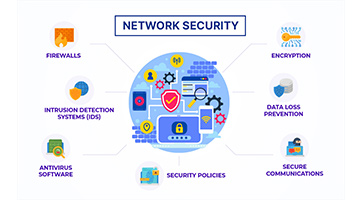Network security involves policies, practices, and technologies designed to safeguard the integrity, confidentiality, and availability of computer networks and data. As cyber threats become more complex and prevalent, robust network security measures are essential for protecting sensitive information and ensuring operational stability.
What is Network Security?
Network security encompasses defenses to prevent unauthorized access, misuse, or damage to network information. This includes hardware and software technologies, processes, and practices aimed at protecting network infrastructure and the data transmitted across it.
Key Features
- Firewalls: Filter traffic between trusted internal networks and untrusted external networks based on security rules.
- Intrusion Detection and Prevention Systems (IDPS): Monitor and respond to suspicious network activity to prevent potential threats.
- Virtual Private Networks (VPNs): Encrypt data transmitted between remote users and corporate networks for secure connections.
- Antivirus and Anti-Malware Software: Guard against malicious software that can compromise network security.
- Access Control: Restrict network resource access to authorized users only.
- Network Segmentation: Divide the network into segments to limit the spread of cyber threats.
- Security Information and Event Management (SIEM): Analyze security alerts from network hardware and applications in real-time.
Benefits
- Data Protection: Shields sensitive business and customer information from theft and unauthorized access.
- Compliance: Meets industry regulations and standards, avoiding fines and legal issues.
- Threat Prevention: Identifies and mitigates cyber threats before they cause significant damage.
- Business Continuity: Prevents network disruptions and data breaches, ensuring smooth operations.
- Enhanced Productivity: Enables secure and efficient employee work without security concerns.
- Reputation Management: Safeguards your company’s reputation by preventing data breaches and maintaining customer trust.
